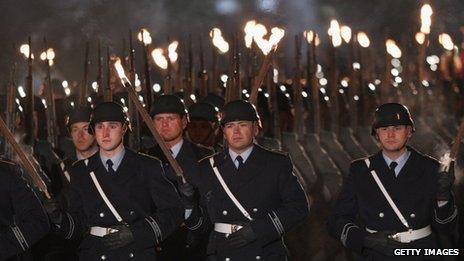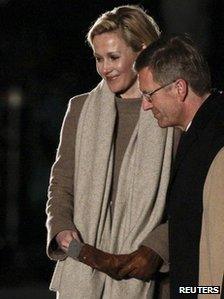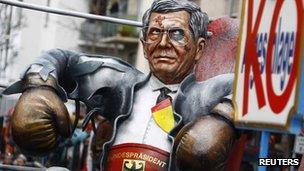No fond farewell for Germany's Wulff
- Published

German soldiers paraded with torches
The president of Germany marked his early departure from office with the grandest of torchlight parades in the full tradition of the Prussian military - and with a squabble over what tunes should be played.
President Wulff was entitled to what is called a Grosser Zapfenstreich, or Grand Tattoo, in front of the presidential palace.
In the dark of night, by the Tiergarten in Berlin, soldiers in full ceremonial uniform carried burning torches. Trumpets sounded. The fife and drum were prominent.
But it did not feel like a celebration. Chancellor Angel Merkel did attend but the four former presidents still alive were not there.
The event was overshadowed by debate over whether it should happen at all because of the allegations of corruption which have forced the current president from office.
Press battle
There was also a row over the music.
President Wulff had requested four pieces instead of the usual three. The newspaper Bild said that he had wanted Ebony And Ivory written by Paul McCartney and Stevie Wonder.
This tune, it said, was deemed by the military band as not suitable for trumpets!
What was played was Somewhere Over The Rainbow, the great hymn to a better life beyond today's troubles from The Wizard Of Oz.
It was an instrumental version, but it was hard to see if anyone was humming the words: "Some day I'll wish upon a star and wake up where the clouds are far behind me."
Not for some time, though.
President Wulff leaves office to deal with investigations into his closeness to business people when he was a prominent politician and finally president of one of the German states, Lower Saxony.
His difficulties started when it was revealed that he had been lent money on favourable terms by a businessman's wife.
He then made two big mistakes: he denied a connection to the businessman when asked by the state's parliament, and he left an angry message on the voice-mail of Bild, Germany's best-selling newspaper when it started investigating and publishing details of the loan.
Hell hath no fury like a newspaper threatened.

The outgoing presidential couple heard the band play Over The Rainbow
Bild went into investigative over-drive, publishing a string of articles about President Wulff and holidays paid for by others.
Where previously Bild had painted him as a happily married family man (helpful to a recently divorced Catholic), it examined every detail of his connections to business.
Where he went and who paid for it, became the leitmotif.
It all became a stand-off between president and press.
He would assert that he had done nothing wrong and papers would reveal more questionable contacts and arrangements.
It became too much when the prosecutors in Hanover, the capital of Lower Saxony, asked the Bundestag to lift the president's immunity from prosecution.
Mr Wulff, the country's youngest ever president at 51 when he took the job in 2010, resigned because he said the trust of the people had "been seriously damaged".
A man once talked about as a future chancellor of Germany will, instead, engage closely with lawyers and prosecutors.
He has one less thing to worry about: ex-presidents are entitled to a pension of 199,000 euros a year.
The papers questioned whether he should get it, but it was decided that he should get the money.
Merkel bruised
And a Grosser Zapfenstreich. It is worth having.
The origins of the grand ceremony are lost in time but a common view is that it goes back to when a trumpet was sounded to "strike the peg" on a barrel so signalling the end of the military day (Zapfenstreich means "strike the tap or plug or peg").

Mr Wulff has already featured in one parade - as a figure of fun at Mainz carnival
The ceremony became grander and much embellished by the Prussians.
It continued through the divided Germany, with the East Germans incorporating For The Peace Of The World by the Soviet composer Shostakovich.
In the united Germany, it is reserved for the departure of presidents, defence ministers, chancellors and the very highest military officers.
Defence Minister Karl-Theodor zu Guttenberg got one when he resigned after being caught plagiarising his doctorate (by the way, for music, he chose Deep Purple's Smoke On The Water).
Apart from offering much food for debate about the musical choices of departing politicians, President Wulff's departure will have some consequences.
It leaves Chancellor Merkel with bruises because he was very much her choice two years ago.
The opinion polls say she remains popular with ordinary Germans, but her government is dependent in coalition on the Free Democrats - if they go, the government falls.
And by all accounts, the FDP stood up to her over a successor to President Wulff.
It wanted the civil rights campaigner Joachim Gauck, whom she had rejected for the post in 2010, and it - rather than she - got its way.
That has led to speculation that the coalition is breakable.
Now the music has died after the Grosser Zapfenstreich, Germany has much to reflect on.
And plain Mr Wulff will be a busy man - but not in a way he would have wanted.
- Published17 February 2012
- Published17 February 2012